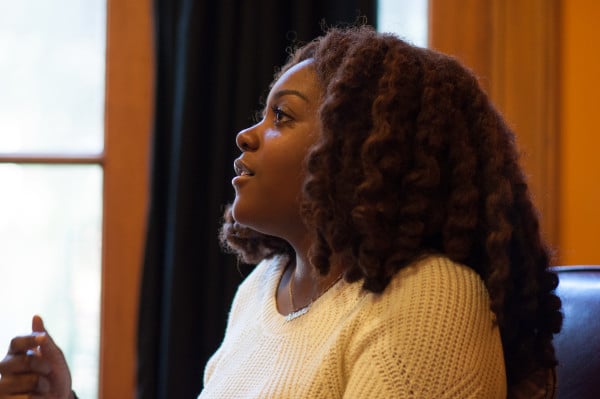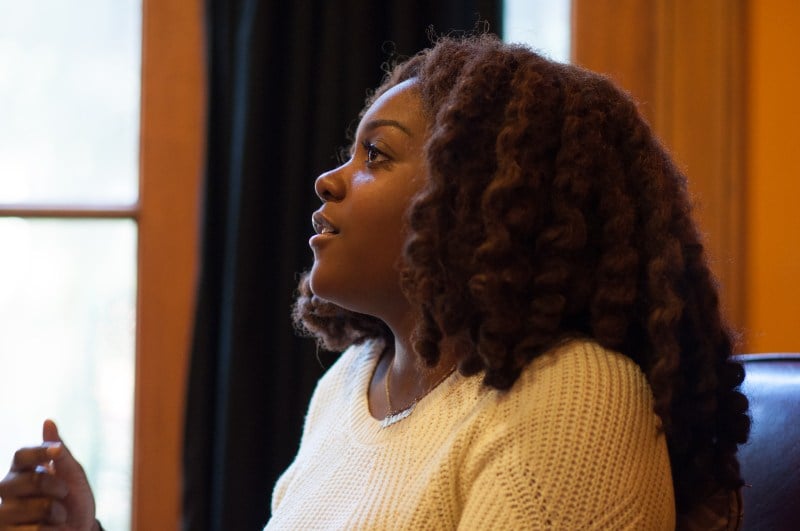
The room was full with students occupying each crevice of open space, an assemblage of dangling feet and note-taking hands papering the air. Noname Gypsy, an elusive and rising underground rapper from Chicago, visited Stanford’s Harmony House last week for an informal talk and Q&A hosted by the Institute for Diversity in the Arts.
A more obscure face among the surging Chicago rap clan, Noname has earned most of her celebrity status from her relationship with Chance the Rapper and her features on his tracks, like “Israel” and “Lost.” But Noname definitely has her own voice to offer, luring us in with flair.
At Harmony House, her lively laugh rang easily while she drifted into darker and more personal spaces. She was engaged, real, not playing some stale role but refreshing the crowd with her easy, unabashed demeanor. Open in an unassuming way, she saw us and we saw her.
Her music mirrors this authentic presence. Like a mix of old-school doo-wop with poignant rap, her tracks meander in and out of soft, rhythmic down-the-block melodies and more fast-paced lyricism. Her sound is innovative with an almost neighborly feel. Like her personality, there is an easiness to it.
Her raps — songs like “Hold Me Up” and “Cherrypie Blues” — themselves are playful and irrevocably honest as they flit from item to item, bringing together all the big and small, the very breath of right now. Wit juxtaposes the melancholic reeling and old-time undertones of her songs. It feels like honey, like waking up with tired eyes, like opening your window to the clamor of the outside world, still wrapped in your comforter.
As Noname herself explains, her music consists of contradiction. While sonically happy, her lyrics tear at a darker reality, again mirroring her personality. Instead of suffocating under singularity, Noname is defiantly authentic, living in the vague sinews of everything. Her art, rather than boxing itself in, is an ode — it is alive. There is a necessary unfinishedness to it, something unanswerable that, in its profound connection to the self, must ramble on.
While profound, touching maybe, Noname herself laughs at these tracks, calling her most popular song, “Paradise,” “trash.” Nowadays, she is working on a new mixtape called “Telefone,” set to come out at the top of next year. She says she is “less consumed with comparing” herself with others, and claims that she is reveling in her own voice more than ever, “creating worlds instead of punchlines.”
The creation of a world, rather than a mirage, is something fundamental to Noname’s future along with her past. While on the verge of developing a new sonic realm, she is also a product of a very particular world. Fostered by the Chicago rap scene, Noname hails from a buzzing nest where she cultivated her artistry alongside the likes of Chance the Rapper and Saba.
Whereas other cultural centers may lay claim to pockets of artistic freedom, most are heavily defined by a certain commodification of creative expression that values popularity over authenticity. Noname’s career – if she is willing to call it that – began in the back corner of YOUmedia, a general community space where, as a self-described “nerdy teen” – she goofed around with Chance the Rapper and other friends, workshopping poems. Together, they created a refuge of self-expression fostered by competitive spirit and familial trust. Rather than create something that is universal to all, that is glossy and contained, they create something that feels whole, rambling, messy, unfinished and personal.
Still, Noname’s music, despite her rise, is a personal endeavor that has remained resilient against industry, as she has thus far refused to sign to a any record label, unwilling to relinquish control over her art. She professes that her art is part of her – or rather is her — and deals not with an ordered, paradisiacal image but rather the gritty realization of becoming.
Contact Tess Michaelson at tess18 ‘at’ stanford.edu.
